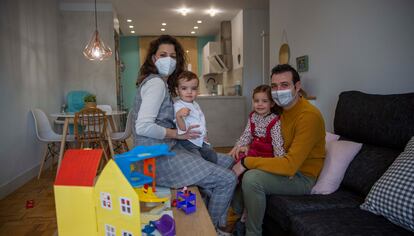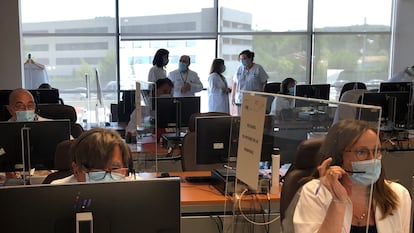Living in the shadow of the coronavirus: how quarantine rules are affecting families in Spain
For the six million people who have had to self-isolate since the beginning of the pandemic, tasks like taking out the trash and buying groceries can turn into problems when no one is at hand to help

The worst-case scenario with respect to the coronavirus is that it proves fatal. The best is that, when it enters the home, it leads to a small domestic revolution in the shape of a 10-day quarantine. But during that time, who looks after the children? Who does the shopping? Who takes out the trash? Or the dog? Neighbors, friends and relatives lending a hand are the most common solution, but quarantine can be a massive upheaval for some families in Spain, and cause problems with employers who don’t understand the need to self-isolate.
Nearly a year into the pandemic, it is not uncommon to find people who believe that a negative PCR test means they do not need to self-isolate. But that is not the case. All close contacts of a person who tests positive for the coronavirus must remain isolated for 10 days, regardless of their own test results. If positive, the test serves to alert their contacts so they can also self-isolate and get tested. And so on. Or that’s how it is meant to work.
The tracker said that each of us should isolate in different rooms, but with a four-year-old girl that is impossibleVanesa, from Aragón, who had to self-isolate after testing positive
But contact tracking has never really taken off in Spain. According to data from the Carlos III Health Institute, for each positive case, an average of just two close contacts are located. This suggests that since the beginning of the pandemic in Spain, in addition to the three million people who contracted the virus, another six million people were also told to self-isolate at home as a preventative measure.
A person must self-isolate if they have spent more than 10 minutes within two meters of a positive case 48 hours before that person showed symptoms. But not all companies are understanding when healthy workers say they need to quarantine. Natalia, who prefers to remain anonymous, says that her bosses “had a fit” when they found out that she had to be confined to her home.
She came into contact with the virus via her young son, who was found to be positive when he underwent a PCR for a gastroscopy. And the most surprising thing was not that her employers failed to understand the quarantine protocols, but that her pediatrician was not very clear about them either. Although no other member of the family was infected, she and her partner, their son who tested positive and their other child had to observe the mandatory 10-day quarantine. At the end of the first 10 days, Natalia’s son could come out of quarantine, but not the rest of the family who had to wait a further 10 days. In other words, the quarantine of the family begins when the supposedly infectious period of the sick person ends: a total of almost three weeks.

“My bosses got very nervous and tried to convince me to fix things with the health authorities,” says Natalia. “But it wasn’t something I could do anything about. Then they pressured me to skip the quarantine and sort something out,” says Natalia, who stood her ground and isolated at home with her partner and their two children.
They did, however, leave the house to throw out the trash. “We went like ninjas in the middle of the night so as not to run into anyone,” she says. What other choice did they have? Neither the doctor nor the health workers asked if they needed help.
Most of those consulted by EL PAÍS say they had to turn to friends or relatives for help, which is what Elena Pérez did when she found out she had the virus and her family had to quarantine in their home in Calahorra, La Rioja. “We sent a shopping list on WhatsApp and they left the shopping at the door,” she says. “We had to take the trash down the first day, because we have a lot with a one-year-old child, but the neighbors found out about our situation and offered to do it for us, so we put it outside the door and they took care of it.”
We communicated by cellphone. With messages, calls and video calls, as if we were in another cityEpidemiologist Loreto Mateos, who tested positive for the virus
Guillermo Martínez, who lives in Rincón del Soto, La Rioja, was asked if he needed help, but he also relied on family and friends. Some Spanish regions provide services to help out in these situations, but often the patients do not even know about them. When Emilio, a resident in Madrid, tested positive for the coronavirus, he did not even receive a call from a tracker to locate him and look for other contacts – a common scenario in the region. And no one offered him any kind of assistance.
In Castile and León, they set up so-called Noah’s Ark hotels to help people who have difficulties when it comes to quarantining at home, either because they lack the necessary conditions or because they do not have anyone to lend them a hand. But, according to the regional department for family issues, demand has been falling and currently there is only one such establishment, which can be found in Palencia. This can be used by people outside the province, but so far this year that has only happened twice. So far, the typical profile of the hotel guests has been a Spanish male from the city, aged between 31 and 50. The service, financed by the region and run by the Red Cross, has helped with 116 cases since it was launched. Other regions consulted did not provide such detailed data, but all mentioned anecdotal cases.
In Aragón, the trackers who contacted Vanesa – who also asked to remain anonymous – did not offer her any options, although the regional government assured her that there is a residence for families in Zaragoza. Vanesa, who was seven-months pregnant at the time, her partner and their four-year-old daughter all tested positive for the virus. “We were starting to have symptoms and we were afraid that they would get worse,” she says. “My parents are in a high-risk group, so who was going to take care of the child? The only thing the tracker said was that each of us should isolate in different rooms so that the viral load would not increase as it passed between us, but with a four-year-old girl that is impossible,” she says. The situation didn’t escalate and everyone recovered. “But you feel very uncertain when you don’t know what’s going to happen,” she says.
What should be done if the virus enters the home?
Loreto Mateos went from studying the virus to becoming just another statistic in Castilla y León. She is an epidemiologist and, last week marked 10 days since she received a positive coronavirus result from a PCR test. As soon as she suspected she had caught the virus, she isolated herself from the rest of her family in a room that had its own bathroom. She had no contact with her partner or her two children, so they have not had to start their own additional 10-day confinement after hers was over.
“We communicated by cellphone,” she says. “With messages, calls and video calls, as if we were in another city. A few things were said through the door, but mostly it was done virtually.”
Her family would prepare food and leave it on a tray at her door. “It’s important that everyone involved in that process washes their hands constantly,” she adds. “We also followed measures such as washing clothes at 60ºC and washing my cutlery in a dishwasher.”
Although she did not see her family for the mandatory 10 days, Mateos insists that it is important to ventilate the house to prevent the virus from spreading through the air. She did this in her room while the others did it in the rest of the house. That way, they avoided any possible spread of infection when she opened the door for meals or via bathroom vents. In the meantime, her family has managed with the help of neighbors and acquaintances who ran small errands for them. And a supermarket near the house allowed them to do their shopping online.
English version by Heather Galloway.
Tu suscripción se está usando en otro dispositivo
¿Quieres añadir otro usuario a tu suscripción?
Si continúas leyendo en este dispositivo, no se podrá leer en el otro.
FlechaTu suscripción se está usando en otro dispositivo y solo puedes acceder a EL PAÍS desde un dispositivo a la vez.
Si quieres compartir tu cuenta, cambia tu suscripción a la modalidad Premium, así podrás añadir otro usuario. Cada uno accederá con su propia cuenta de email, lo que os permitirá personalizar vuestra experiencia en EL PAÍS.
¿Tienes una suscripción de empresa? Accede aquí para contratar más cuentas.
En el caso de no saber quién está usando tu cuenta, te recomendamos cambiar tu contraseña aquí.
Si decides continuar compartiendo tu cuenta, este mensaje se mostrará en tu dispositivo y en el de la otra persona que está usando tu cuenta de forma indefinida, afectando a tu experiencia de lectura. Puedes consultar aquí los términos y condiciones de la suscripción digital.









































